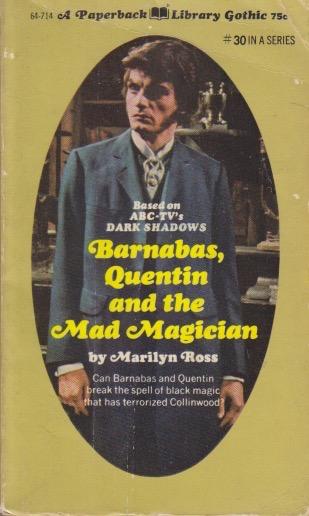
The Dark Shadows novels supplemented my early watching of the television series. It’s funny, but when I remember watching the show, in my mind I watched it alone. During a conversation with one of my brothers recently, he assured me that he had watched the show too, pointing to the selectiveness of memory. What I do know is that I was the only one who read the novels. I bought them when I could find them used, and I kept them in an old pasteboard suitcase (we had no bookshelves and my parents didn’t read). I didn’t have the entire collection by a long shot and I can honestly say I don’t know which ones I read back then. I am now, however, two novels from finishing the entire series—a project I began around 2006.
Barnabas, Quentin and the Mad Magician follows the usual formula, although this time around Barnabas is temporarily cured of his vampire curse and Quentin doesn’t turn into a werewolf at all. They are on friendly terms and both are being set up by the rather obvious antagonist, the mad magician. I guess you can begin to see the series winding down. Most of the thirty-two stories are broadly similar and the writing is that rushed, breathless kind that seems characteristic of those who make a living delivering pulp fiction. There have always been people like me who will buy it. That’s the reason I typically use the phrase “guilty pleasure” when describing these novels.
As I note in my YouTube video on the phenomenon, Dark Shadows was quite popular in its day. It’s what we might now call a cultural meme. Television series, novels, two movies, comic books, lunch boxes—the whole coffin. The monsters were likable. That was true of some of the greats—you felt sympathetic toward them. As horror began to “grow up” the monsters often became entirely reprehensible, with no redeeming qualities. So as Barnabas and Quentin do their best to expose the true monster, their supernatural powers currently on hold, they have to rely on their money and connections. Even at the end the “confession” is made suspect by the longer tacked on ending. If you’ve read enough of these, you grow suspicious when there are ten pages left after the antagonist dies. Stories such as this aren’t great literature, but they do fill a gap in the world of monsters that nostalgia leaves for those who knew Dark Shadows in the late sixties.
